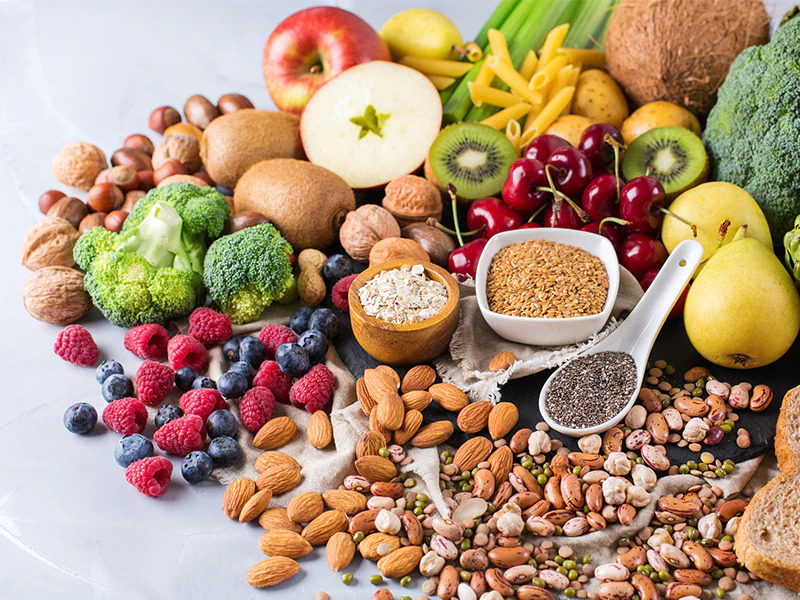Built to help women have a 360° approach to health through perimenopause to post-menopause.
welcome to MY BLOG
Why fibre is essential for overall health

May 20, 2024
Fibre provides numerous health benefits as it travels through your digestive system. Besides aiding digestion, fibre supports many body systems.
Fibre is a carbohydrate found in plants. It comes in different types and acts as a prebiotic, feeding beneficial gut bacteria needed for a healthy gut microbiome.
Fibre’s benefits extend beyond gut health and support fat loss. High-fibre foods help you feel full longer, reduce cravings, and stabilise blood sugar by slowing carbohydrate absorption, preventing insulin spikes that can hinder weight loss.
Fibre also helps manage cholesterol, lower heart disease risk, and control inflammation. It aids hormone balance by binding and eliminating toxins and excess hormones like oestrogen, preventing their reabsorption.
How Much Fibre Do You Need?
The recommendation is 25 grams of fibre daily for women, but only 9% meet this, with the average intake being 15 grams. Aim for 50 grams daily, as research suggests our ancestors consumed about 100 grams daily, and this higher intake lowers colon cancer risk.
Fibre comes in two types: soluble and insoluble. Soluble fibre dissolves in water, forming a gel-like substance that regulates blood sugar and cholesterol. Good sources include oats, fruits, and vegetables. Prebiotics, a type of soluble fibre, fuel beneficial gut bacteria, promoting gut health. Examples include inulin from chicory root, FOS from green bananas, and resistant starch from cooked and cooled potatoes.
Insoluble fibre absorbs water, adding bulk to stool and aiding its movement through the digestive tract. Foods rich in insoluble fibre include nuts, seeds, and legumes. Many plants contain both fibre types. If you’re short on fibre, Extra Fibre provides 12 types of soluble and insoluble fibres from various sources, easily mixing into smoothies or liquids.
How to Track Your Fibre Intake
Optimal fibre intake involves balanced meals with protein, healthy fats, fibre, and slow low carbs. Protein and fibre slow stomach emptying, improving satiety. Fat triggers hormones signalling fullness. Fibre-rich vegetables provide fibre and antioxidants, while low-glycemic, high-fibre carbs release sugar slowly, maintaining stable blood sugar and low insulin, promoting fat usage for energy.
Know Your Best Fibre Sources
Here are some high-fibre foods to consider:
Best Non-Starchy Veggies for Fibre
Aim for at least two servings per meal, totalling 5-10+ servings daily. High-fibre choices include:
– Broccoli: 5.2g per cooked cup
– Cauliflower: 4.9g per cooked cup
– Collard greens: 4.8g per cooked cup
– Kale: 4.7g per cooked cup
– Spinach: 4.4g per cooked cup
– Red cabbage: 4.1g per cooked cup
– Swiss chard: 3.7g per cooked cup
Best Slow Low Carbs
Keep these to no more than 2 servings per meal and fruit to 2 servings daily. High-fibre choices include:
– Adzuki beans: 8.4g per ½ cooked cup
– Split peas: 8.2g per ½ cooked cup
– Lentils: 7.8g per ½ cooked cup
– Black beans: 7.5g per ½ cooked cup
– Chickpeas: 6.3g per ½ cooked cup
– Sweet potatoes: 6.3g per cooked cup
– Quinoa: 5.2g per cooked cup
– Avocado: 5g per half
– Oats: 4g per cooked cup
– Raspberries: 4g per ½ cup
– Blackberries: 3.8g per ½ cup
Best Fat Sources for Fibre
Nuts and seeds are high in fibre, protein, healthy fats, and essential minerals. High-fibre options include:
– Chia seeds: 4.1g per tablespoon
– Pecans: 4g per ounce
– Almonds: 3.5g per ounce
– Sunflower seeds: 3.1g per ounce
– Pistachios: 2.9g per ounce
– Flaxseeds: 2.8g per tablespoon
– Macadamia nuts: 2.4g per ounce
– Walnuts: 2g per ounce
– Pumpkin seeds: 1.7g per ounce
– Nut butter: 1.6g per tablespoon
Thanks for reading!
P.S If you´ve enjoyed this, please spread the love and forward it to your friends. And if you share any parts of it on Instagram, please tag me – I love getting to see how it helps other ladies!
Louise xx
Leave a Reply Cancel reply
I have a reputation as a compassionate and innovative therapist who produces rapid and lasting changes with my clients. Are you ready to become my next success story?
Website Designed W/ Love By Traveller By Trade
Copyright © 2021, Louise The Therapist
Privacy Policy